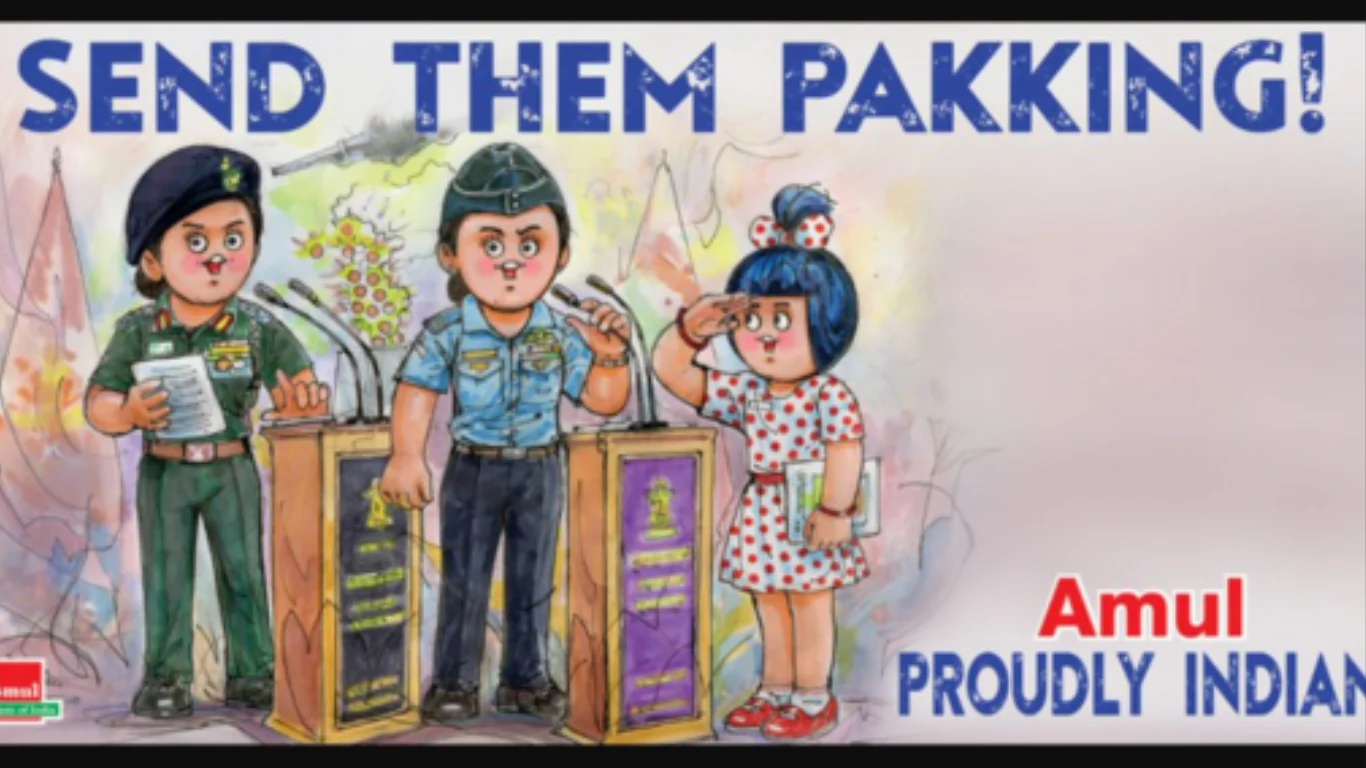
As tensions continue to rise between India and Pakistan following a deadly terrorist attack and subsequent military operations, the ripple effect of this geopolitical escalation has reached beyond just border regions and diplomatic corridors—it’s sparked a wave of reaction across social media, with citizens, influencers, and brands weighing in on the moment. One of the most talked-about responses has come from India’s beloved dairy brand, Amul, whose topical advertisements are known for their sharp wit, cultural relevance, and instant resonance with the public. Their latest ad, featuring the powerful slogan “Send them pakking”, has gone viral, winning widespread applause from netizens and affirming once again why Amul remains such a cherished part of Indian pop culture.
The background to this ad lies in the most significant flare-up between India and Pakistan in recent years. On May 7, 2025, India launched Operation Sindoor, a precision military operation targeting nine terror infrastructure sites across Pakistan and Pakistan-occupied Jammu and Kashmir (PoJK). This action was taken in direct retaliation for the April 22 terror attack in Pahalgam, Jammu & Kashmir, which left 26 civilians dead and dozens injured. The Indian government, citing credible intelligence, held Pakistan-based terrorist organizations responsible for orchestrating the carnage and vowed a proportionate response. Operation Sindoor was not only swift but also widely publicized, with Indian defence officials holding a joint briefing to detail the scale and intent of the operation.
It was during this joint briefing that the public saw Colonel Sofia Quraishi of the Indian Army’s Signal Corps and Wing Commander Vyomika Singh, a helicopter pilot in the Indian Air Force, standing beside Foreign Secretary Vikram Misri, addressing the nation and the global media. The poised presence of these women officers became emblematic of India’s new military narrative—one of strength, resolve, and gender-inclusive leadership. Their images, along with that of the dignified Foreign Secretary, have since been widely shared online, symbolizing not only operational transparency but also national unity in the face of threats.
Enter Amul. Known for its brilliant use of satire and national sentiment in its long-standing topical ads, Amul quickly released a doodle that captured the spirit of this moment. In the artwork, the iconic Amul girl, dressed in uniform, is seen saluting Colonel Quraishi and Wing Commander Singh, who are depicted standing proudly at podiums alongside Foreign Secretary Misri. The slogan “Send them pakking” is written in bold letters—a play on words that simultaneously references the act of repelling Pakistani aggression and fits Amul’s signature style of puns and wordplay. Beneath it is a statement that reads, “Amul: Proudly Indian”, leaving no ambiguity about the brand’s patriotic stance.
The post was shared on X (formerly Twitter) with the caption “Amul Topical: The India-Pakistan conflict”, and almost instantly, it began attracting thousands of likes, shares, and emotional reactions. From civilians to veterans, students to influencers, the response was overwhelmingly positive. One user commented, “Let’s do it permanently,” suggesting enduring support for a strong Indian military response. Another called the ad “lovely,” praising not just the design but the message it encapsulated. A third user simply wrote, “Love you, Amul,” echoing the sentiments of generations who have grown up with the brand’s quirky, timely takes on national issues. A fourth summed up their emotions with a salute emoji, a quiet but powerful nod of respect.
Amul’s ability to capture such moments is not new. Since the 1960s, the brand has been using its “topicals”—hand-drawn illustrations paired with witty captions—to comment on everything from cricket wins and Bollywood blockbusters to political developments and natural disasters. What sets the brand apart is not just its speed in reacting to current events, but the emotional intelligence and cultural awareness embedded in each ad. In this instance, the ad didn’t merely take a political stance; it celebrated the bravery of Indian armed forces, acknowledged the role of women in the military, and reinforced national pride at a time when the country is grappling with grief and anger.
In a time where commercial brands often tread cautiously around geopolitical issues, fearing backlash or controversy, Amul has stood firm in its tradition of fearless commentary. This particular ad comes at a moment when emotions are running high across India. The Pahalgam terror attack is still fresh in public memory, and the images of Indian airstrikes and Pakistani provocations—drone attacks, artillery fire, and ceasefire violations—have flooded news cycles. People are looking for symbols of strength and unity, and Amul, with its familiar mascot and unfiltered messaging, offers just that.
In addition to being a cultural touchstone, Amul’s topical ads also serve as historical documentation of public sentiment. Their archives over the decades read like a social chronicle of India’s modern history. From moments of triumph—such as India’s moon landing missions and World Cup wins—to times of sorrow, such as natural calamities or acts of terror, Amul has been there with a message that reflects the pulse of the nation. This latest ad is no different—it’s not just a marketing gimmick, but a salute to the resilience and valor of India’s defense personnel, especially its women officers who are increasingly taking center stage in the country’s strategic affairs.
As for Operation Sindoor, military analysts and defense officials believe that while it has delivered a strong message to cross-border terror outfits and their backers, the need for continued vigilance remains. Pakistan’s recent use of missile and drone technologies to target Indian military bases—including those in Jammu, Pathankot, and Udhampur—has led to air raid alerts in several cities, including Chandigarh and Patiala. Emergency measures have been put in place, and border districts are under tight surveillance.
Against this grim backdrop, the Amul ad serves not only as a reminder of India’s readiness to defend itself but also of the spirit of solidarity that runs deep within the country. In moments of tension and uncertainty, such expressions of national unity—whether through policy, military action, or even clever advertising—can offer reassurance and reinforce collective resolve.

















